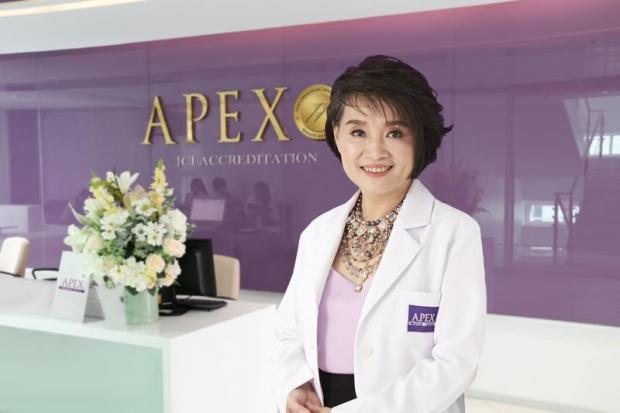
Thai dermatological centres are building up capacity to cope with rapidly increasing medical tourism demand, said Nantapat Supapannachart, chief executive of Apex Medical Center.
Apex Medical Center, which started out at Emporium, has grown at an average rate of one centre per year for the last 20 years and plans to add no fewer than 10 new locations over the next three years to capitalise on increasing demand.
Apex's revenue grew by 50-60% last year, and 20% growth is expected this year.
The expansion will be fuelled by cash on hand and through a partnership with Singapore-based investment firm TE Asia Healthcare Partners, itself backed by TPG Capital, a US-headquartered fund with more than US$79 billion (249 billion baht) under management.
"Some companies have expanded to over 100 clinics," Dr Nantapat said. "Our strategy is different, because we primarily serve the high-end market, we prefer to expand more cautiously in order to ensure we comply with international standards."
Medical specialists, cosmetic and non-cosmetic, are rushing to cash in on growing disposable income among Chinese people.
"The market for cosmetic medical tourism will run in the billions of dollars in the next 10 years, and likely be larger than that of IVF or other reproductive services," Dr Nantapat said.
Thailand's IVF clinics, are moving to capture up to 1% of the 90 million Chinese couples looking to have a second child, given the persistent undersupply of reproductive clinics in China, said Wei Siang Yu, chairman of Borderless Health Group (BHG), a Shanghai-based firm that offers overseas fertility healthcare packages.
The growth rates of procedures like IVF and cosmetic procedures like Botox may be intimately linked, however, given the increasing emphasis on cross-selling strategies.
Apex, for example, is moving away from a mall clinic model, intending to build larger stand-alone buildings with various departments that facilitate the sale of complimentary services.
While the Chinese dermatology and cosmetic surgery market is in its early stages, it is already driving world demand, growing at an annualised rate of close to 9.7%, according to data from market research provider IBIS World.
There is still much room for growth. China's $230 million dermatology market is expected to start closing the gap with the $13-billion US market, as perceptions of cosmetic procedures change and the country sees another 300 million step into the middle-class in the next decade.
By many measures, Thailand is positioned to capture at least part of this growth.
The country has developed a robust medical tourism infrastructure over the span of more than a decade, which includes not only hospitals and clinics, but also ancillary services like spas, fitness centres, and wellness products.
Moreover, medical services in Thailand are 35% cheaper than in other popular Southeast Asian destinations like Singapore and Hong Kong, and close to 45% cheaper than in the US.
Apex Medical Center is projecting a 300% increase in foreign clients in the next few years, according to Dr Nantapat.
Moving forward, Thermage, Ulthera and Botox will continue to provide the bulk of the centre's turnover.
However, surgery and procedures popular with expats and tourists, such as cryotherapy, in which patients are treated using temperatures as low as -100C, will become a greater part of turnover, Dr Nantapat said.
Demand for dermatological and cosmetic services has been growing at a rapid clip over the last five years, driven not only by foreign tourists but also by an ever-larger chunk of the Thai population.
The population is ageing, Dr Nantapat said, and "younger people, and males are looking for these services, which were previously mostly restricted to older females".
Part of the growing appeal of dermatology for younger clients is that newer technology allows for immediate results, which they have also come to expect in other areas of their lives.
"You can see the results of fillers and a lot of laser procedures immediately after they are applied," Dr Nantapat said.
Supply has more than kept up with demand, with new clinics rising up frequently even in Bangkok's exurbs, but there is no oversupply yet, she said. "There is room for growth in either the low, middle, or upper-class segments, but we may see an oversupply if a large proportion of players all start focusing one of these segments."
As low-cost players enter the market, one of the most important challenges will be keeping prices up.
"We have to make consumers understand that we are not competing on price, but on quality," Dr Nantapat said.

Surgery is one of Apex's fastest growing services